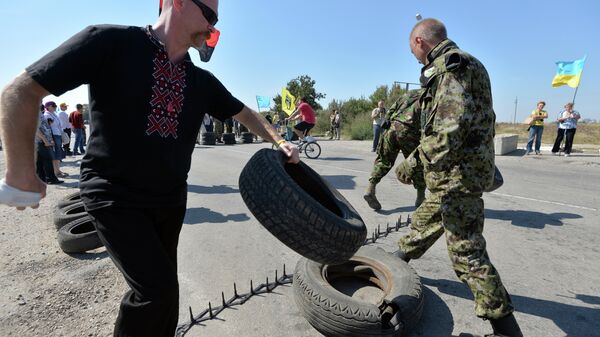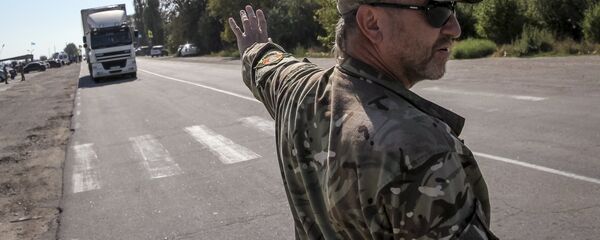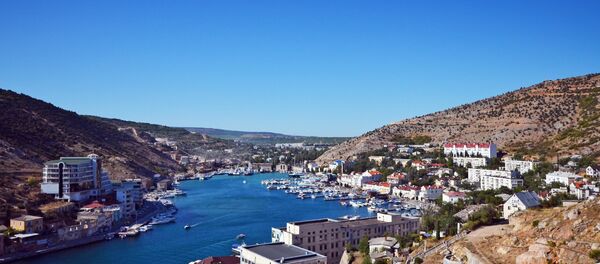The governor warned that these "unofficial groups" could go on to demand power, confident that having "crossed the line," they may come to think of themselves as arbiters of state power. "The state must not give up to anyone its monopoly on the use of force," he emphasized.
Others criticized the logic and timing of the blockade, which was announced last week by Poroshenko Bloc MPs Refat Chubarov and Mustafa Dzhemilev, who also serve as leading figures in the Mejlis of the Crimean Tatar People, a group claiming to represent the peninsula's Tatar community.
Vehement Russia critic Adrian Karatnycky, Senior Fellow at the Atlantic Council and former president of US government-affiliated NGO Freedom House, sarcastically commented that with a "serious ceasefire in the Donbas…let's start heating things up in the Crimea. Let's enrage Putin; that way we can help the peace process. Timing and sequencing is everything in the tactics of war and political struggle. Opening up a two front struggle now is –with all my respect for the Crimean Tatars –frankly insane."
There's a serious ceasefire in the Donbas. So. let's start heating things up in the Crimea. Let's enrage Putin that way…
Posted by Adrian Karatnycky on Monday, September 21, 2015
Shaun Walker, The Guardian's Moscow correspondent, tweeted that he personally "really [doesn't] get the logic of this Crimean Tatar / Pravy Sektor blockade of Crimea at all…"
Maybe I'm missing something, but I really don't get the logic of this Crimean Tatar / Pravy Sektor blockade of Crimea at all…
— Shaun Walker (@shaunwalker7) 20 сентября 2015
Meanwhile, in an opinion piece published by the US-funded broadcaster Radio Free Europe's Crimean Service, columnist Ivan Serhiyenko offered a detailed criticism of the blockade, saying that it will not help the cause of the Tatar activists' human rights (ostensibly the reason for the blockade in the first place), adding that the obstruction is not only unlawful, but that it won't cause any major economic damage to Crimea's economy. He complained that Kiev does not have a coherent strategy on returning Crimea, or even the Donbass region, to Ukraine. He lamented that ultimately, the blockade is "doomed to failure."
English-language social media jumped in to poke holes in the initiative, one user asking "how exactly is the blockade supposed to make more [Crimeans] desire to be 'un-annexed'?"
@vorobyov Do the residents of Crimea agree? How exactly is the blockade supposed to make more of them desire to be "un-annexed"?
— Nick Smith (@NickSmithSSSC) 20 сентября 2015
Others challenged the timing, even if they supported the spirit of the initiative:
Crimea Blockade's by the Tatars is brilliant, but why now? Why has Ukraine done trade with them for so long. #crimeablockade #crimea
— Vijai Mahesh (@vijaimaheshwari) 20 сентября 2015
Their commentary echoes that of Crimean officials themselves, with First Vice-Premier Mikhail Sheremet suggesting that if Kiev actually sought to harm Crimea's economy, "such a provocation should have been done a year ago. Today, we are not dependent on the Ukrainian market."
Others challenged the media narrative being spun in Ukraine, citing not only the blockade's foolishness, but emphasizing that this is not an "initiative of the Tatar community," but rather of "self-proclaimed radical religious leaders of Mejlis who pretend to represent [the] majority."
"#Crimea|n Tatars"? You mean self-proclaimed radical religious leaders of Mejlis who pretend to represent majority? https://t.co/EqnKEBrZkU
— In The Peninsula (@Inthepeninsula) 20 сентября 2015
Tatar Mejlis radicals blockading #Crimea pretend to be voice of the majority. Chongar-Armyansk crossing. pic.twitter.com/GQVJvRGDS5
— In The Peninsula (@Inthepeninsula) 20 сентября 2015
Meanwhile, Crimean authorities continued to voice their bewilderment at the rationale behind the decision; Prime Minister Sergei Aksyonov calculated that Russian and Crimean-made products already constitute 95 percent of the peninsula's consumption, and told Russian television that the blockade will only serve to completely eliminate Ukrainian food supplies from the Crimean market.
"This approach will result in Ukrainian goods being pushed out of Crimea's market completely within the course of two weeks. This action seems to be directed primarily against the citizens of Ukraine, who live in the regions of Kherson and Mykolaiv. Crimea will calmly live through it," Aksyonov told news channel Russia 24.
In their initial response, Crimean officials took the blockade almost as a half-hearted joke, Aksyonov suggesting that it reminded him of a scene from an old Soviet cartoon, while Vice-Premier Sheremet called it a "political farce" demonstrating its organizers' true attitudes toward the Crimean people.
Other Ukrainian media, aimed at the domestic market, could not help but express their joy over the blockade. Compiling the reactions of Kiev-based politicians, experts and social organizations, news portal Obosrevatel quoted 'political scientist' Alexei Golobutskiy, who suggested that "the blockade of Crimea is a very good thing. Let them eat tourists from Russia."
The Ukrainian media's allegations about Russian authorities' "human rights abuses" against the Crimean Tatar minority are not difficult to refute, with statistics showing the reality on the ground. Out of the 260,000 Crimean Tatars living on the peninsula, only 500 have refused to exchange their Ukrainian passports for Russian ones. Moreover, among the 600-800 Tatars who left Crimea for mainland Ukraine as a sign of protest in the aftermath of the March 2014 referendum, which saw the peninsula's return to Russia, over half have already returned to the peninsula, most even receiving state assistance in getting Russian citizenship and finding employment.
With even long-time supporters of authorities in post-Maidan Ukraine beginning to ask tough questions about the rationale behind the blockade, while Kiev continues to remain silent on the issue, logic seems to dictate that it will only be a matter of time before the blockade comes to an end. Otherwise, Ukraine's already battered economy stands to lose another half-a-billion dollars' worth in trade over a cause which Crimean Tatars inside Crimea itself have said is only meant to inflate their Kiev-based 'representatives' egos.




